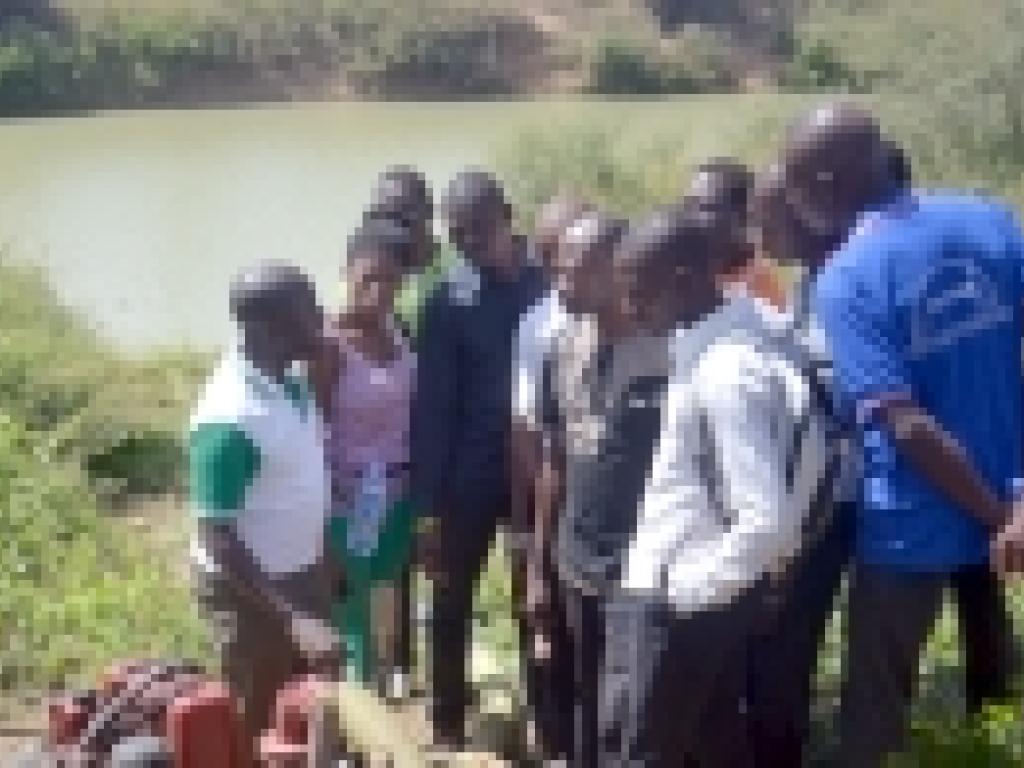Improving irrigation systems for smallholder farmers – the key for resilient agriculture in semi-arid Ghana

By Prince Ansah, Ekua Odoom and Rahina S. Alare
Agricultural activities by smallholder farmers in the semi-arid region of Ghana have been challenged by water scarcity due to frequent droughts and increasing dry spells. In response to these climatic conditions, irrigation and agricultural water management have been proposed as the way forward to improving food security and livelihoods of vulnerable farmers, especially in the dry season.
While such interventions are capital-intensive and beyond the capacity of vulnerable smallholder farmers, institutional support between state actors and other NGOs in the region can play an important role in providing irrigation facilities as well as creating an enabling environment for all-year farming in the region. From the Transformative Scenario Planning (TSP) process, access to water and political commitment were also identified as the two key driving forces affecting agriculture and food security in Upper West Region.

Model irrigation field at Mettoh Community in Upper West Region, Ghana.
It is against this background that the ASSAR Ghana team organised a two-day workshop, with the support of a START International Scenario Based Capacity Building (SBCB) grant, to strengthen irrigation management practices for dry-season farming in Upper West Region’s Nandom and Lawra districts.
The workshop, which was organised in collaboration with the Department of Agriculture (DoA) in both Lawra and Nandom districts, took place on 18 and 19 January 2018 at the Lawra District Assembly conference hall and convened a number of key stakeholders from both districts, including irrigation farmers’ association leaders, technical experts from the Ghana Irrigation Development Authority (GIDA), Department of Agriculture (DoA), District Assembly, NGOs and agricultural input dealers.

Participants during the first open session of the workshop.
The first day of the workshop focused on getting participants to discuss the major issues hindering dry-season farming in the region. Three groups including farmers, technical experts and input dealer groups were formed to discuss specific issues identified within their work during dry-season farming activities. The workshop adopted the Participatory Scenario Planning (PSP) model to comprehensively tease out the issues and find local solutions to the identified problems. Some of the challenges mentioned in the group discussions were issues related to inadequate finances, poor information access, weak organisational and governance structure, poor market systems and inadequate technology.
Among all the challenges discussed, the issues of low ratio of agriculture extension officers to farmers and poor organisational structure of farmer associations were considered the most outstanding challenges in the region. However, to overcome these challenges, the participants noted the need for increased capacity building and provision of financial support to farmers, technical officers and input dealers. Institutions identified to play key roles in making these solutions possible were: the DoA and GIDA, research institutions, district rural banks and farmer-based associations. The role of the DoA and GIDA will be to provide technical capacity support, while research institutions will provide appropriate and effective technology and information, district rural banks will provide soft loans to farmers, and there will be a well-organised farmers’ association to work with.

Groups working on the challenges and solutions to dry-season farming.
Participants also visited a demonstration farm near the Black Volta at Mettoh community in the Lawra District, as part of the second day of the workshop’s activities. Technical officers from GIDA and DoA took farmers through some water management and agronomical practices which are been used and yielding results on the demonstration farm. One of the community farmers’ group leaders expressed satisfaction with the practical skills he obtained during the field visit:
“This field trip has helped me to know how sprinklers are joined properly, especially how the T-junction is joined from the main pipe. Even though I had a similar training about seven years ago, it was not as easy as the one being demonstrated to us on the field today. The price is also much cheaper than what I have always known.” – A farmer group leader


Farmers and experts interacting during a field trip to a demonstration farm near the Black Volta.
The overall outcome of the workshop was to initiate the formation of an irrigation farmer association at district level through the strengthening of irrigation farmer associations at the community level. The workshop also provided a platform for the creation and strengthening of a farmer-expert linkage platform in the districts to provide knowledge sharing and network building among farmers and technical experts.
Above all, the key product from the workshop was the development of advisories to guide farmers, agriculture extension officers and input dealers to improve dry-season farming in the districts.

Group presentation leading to the drawing of advisories.
One participant had this to say after the workshop:
“This workshop has helped to emphasise the need for strong associations, not only for farmers but also for input dealers. As an input dealer, I understand the need to work with strong and recognised irrigation farmer associations in the district, rather than individual farmers, which comes at a high risk. Even with a poor harvest, I know that my investment is safe with the risk shared across members.” – Input dealer
This workshop is part of a series of ASSAR Ghana’s Research into-Use (RiU) activities in response to the adaptation challenges identified in its research activities and in line with the ASSAR West Africa impact pathway on building skills and capacity of local champions who promote adaptation activities at the local level. It was facilitated by Prince Ansah, Technical Officer, ASSAR Ghana, and Ekua Odoom Semuah, an ASSAR PhD student at the Institute for Environment and Sanitation Studies (IESS).
All photos by Kwame Asante